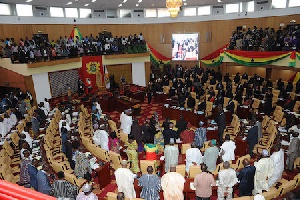Mr Samuel Zan Akologo, Executive Secretary, Department of Human Development at the National Catholic Secretariat, Accra, has entreated Ghana's lawmakers to respect the common good of the people at all times in the policy choices they make.
Mr Akologo made the appeal in a presentation on the topic: 'Parliamentary Knowledge-Base, an Effective Resource for Evidence-Informed Policy Making' at a recent sensitisation meeting with Parliament of Ghana, organised by the Ghana Information Network for Knowledge Sharing (GINKS).
He explained Evidence-Based Policy Making to mean a public policy informed by rigorous established objective evidence of what works and has desirable impact.
He cautioned that Evidence-Based Policy Making, which has received much intellectual support from experts, should not be taken hook, line and sinker in its application, but be properly scrutinised first.
“Existing notions about the policy approach have to be unpacked and interpreted in [the] local context,” he proposed, adding that “the sense of urgency may necessitate short-term and provisional policy decision-making to save lives.”
He stressed that description of Africa in current development discourses as a rising continent on platforms which hitherto painted the continent very bleak was due to Africa's resolve to champion tolerance, accountability, democracy, as well as inclusive social and economic development.
Mr Akologo commended Parliament's policy-making role, which he said was at the core of this achievement.
According to him, the foundation of public policy was composed of national constitutional laws and regulations, and that strong public policies would solve problems efficiently and effectively, serve justice, support governmental institutions and encourage active citizenship.
The Executive Secretary noted the central and critical role of policy-making to eliminating the causes of misery and enhancing opportunities for wellbeing. He noted that required new knowledge to confront new challenges now and in the future.
The international community is currently negotiating what is popularly called the Post 2015 Development Agenda or Sustainable Development Goals (SDGs).
He described the SDGs as inspirational and ambitious in tackling the root causes of poverty, exclusion, inequality and post-conflict fragility. He noted all these would require sound public policies to deliver the intended outcomes.
He observed that the Common Africa Position (CAP) and the fiftieth anniversary resolution – AGENDA 2063 of the Africa Union were remarkable regional governance initiatives, but that “they will remain meaningless unless they are consciously and purposefully domesticated in the respective national policies.”
He emphasised that the energy crises in Ghana, the burgeoning national debt, perverse corruption and threat of the Ebola Viral Disease (EVD), among others, required effective public policy actions based on sound knowledge, experience and strategic thinking. He quoted the Pew-MacArthur Results First Initiative on the Evidence-Based Policy Making, which suggests that Governments could reduce wasteful spending, expand innovative programmes and strengthen accountability through Evidence-Based Policy Making.
With over two decades of Ghana's sustained parliamentary democracy, Mr. Akologo, indicated that Parliament could do a lot of introspection on how they have fared in the light of Evidence-Based Policy Making, as well as assess challenges they encountered in their effort to aspire to the ideals of Evidence-Based Policy Making.
Touching on evidence versus propaganda in policy making, he noted that sometimes propaganda messages could become the basis for policy or programme interventions as commonly seen in humanitarian policies and interventions in Africa.
The Executive Secretary noted that too much emphasis on evidence-informed decision-making could lead to inaction and indifference, stressing that common sense in some matters requiring action was key!
“What further evidence do Ghanaian Policy-makers need to act on corruption when the manifestations are all over the place and biting the poor very hard and mercilessly?” he queried.
He argued that Evidence-Based Policy Making has the tendency to have fixed prescriptions for all, and risks repudiating indigenous knowledge, since the approach focuses much on scientific knowledge.
Mr Akologo also added that Evidence-Based Policy risks encouraging endless policy experimentation, which he warned could reduce emerging democracies to 'Guinea-pigs of policy making'.
Politics of Sunday, 1 March 2015
Source: Public Agenda

















